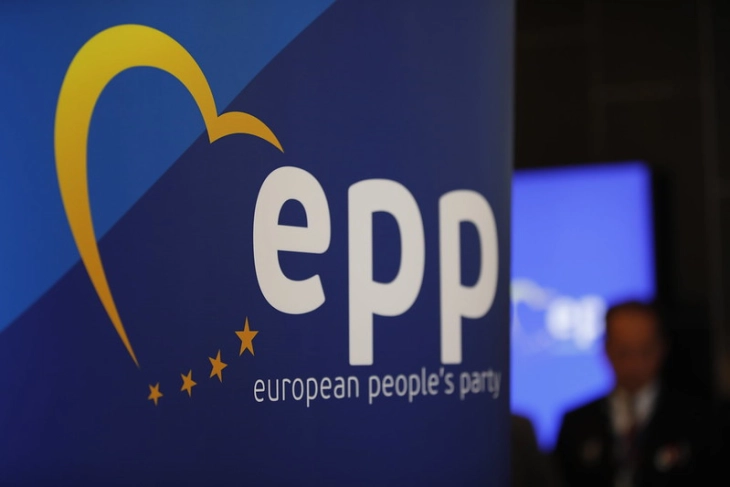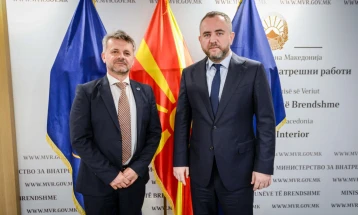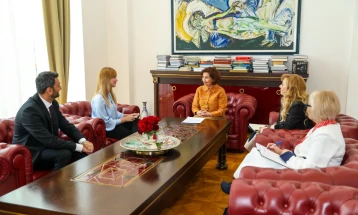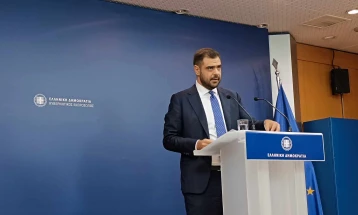Euractiv: EPP fumes at VMRO-DPMNE after Siljanovska-Davkova's inauguration
- North Macedonia’s election-winning nationalist VMRO-DPMNE party has sparked reactions across Europe and from its own EU family, the center-right European People’s Party (EPP), after President Gordana Siljanovska-Davkova refused to use the country’s official name during her inauguration on Sunday, the European media network Euractiv wrote.
- Post By Magdalena Reed
- 12:14, 14 May, 2024

Skopje, 14 May 2024 (MIA) — North Macedonia’s election-winning nationalist VMRO-DPMNE party has sparked reactions across Europe and from its own EU family, the center-right European People’s Party (EPP), after President Gordana Siljanovska-Davkova refused to use the country’s official name during her inauguration on Sunday, the European media network Euractiv wrote.
"Siljanovska-Davkova, a member of VMRO-DPMNE, called the country 'Macedonia' instead of North Macedonia, the official constitutional name after the 2018 name-change deal with Greece, otherwise known as the Prespa Agreement," the Euractiv article said.
The media outlet said that the new President's office on Monday said Macedonian President Gordana Siljanovska-Davkova had the right to use the name Macedonia in her public appearances as an act of exercising her personal right to self-determination.
"The Greek ambassador to Skopje left the swearing-in ceremony, and the Foreign Ministry said Greece categorically declares that further progress in its bilateral relations with North Macedonia and its European journey depends on the full implementation of the Prespa Agreement and, above all, on the use of the constitutional name,” Euractiv wrote.
The refusal to use the agreed country name also upset the EPP, whose Secretary General, Thanasis Bakolas, a Greek, did not congratulate VMRO-DPMNE or the president for their triumph in a double parliamentary-presidential election, according to the article.
“Their intentions were fully revealed with this incident,” an EPP source told Euractiv.
The source also said that after the EU elections in June, a general “house cleaning” would take place regarding some parties’ membership and that the VMRO-DPMNE party “tops the list”.
"European Commission President Ursula von der Leyen, also from the EPP, warned Skopje that to continue on its EU path it is 'paramount' that it fully respects binding agreements, including the Prespa Agreement," Euractiv wrote, adding that EU Council chief Charles Michel also described the incident as “disappointing.”
According to Euractiv, an EU source familiar with the matter commented that it was bad to start in office by rejecting one of the key preconditions for the country to move forward on the accession process.
The German Federal Foreign Office spokesperson also raised the issue, saying, “There is an agreement under international law, the so-called Prespa Agreement with Greece, and North Macedonia is also bound by it under international law.”
Responding to Euractiv Germany if there could be consequences after the initial signals from Skopje, the spokesperson replied that it was clear that the Western Balkans belong in the EU and that the German government was very active in this area "because we cannot tolerate grey areas in Europe, and if we leave these grey areas, they will be occupied by others. In this respect, we are also committed to the Western Balkans policy.”
Meanwhile, Athens immediately called on Skopje to stick to the Prespa Agreement, Euractiv noted.
"Greek Prime Minister Kyriakos Mitsotakis, whose ruling New Democracy party (also EPP) strongly opposed the Prespa Agreement when it was in opposition but then accepted it, said Siljanovska’s statement was 'illegal'," the article read, quoting the PM as saying that Siljanovska-Davkova "violated the Prespa Agreement as well as the Constitution of her own country."
According to Greek lawmaker Makis Voridis also quoted in the article, if the context of North Macedonia was questioned, “tomorrow morning, you have a country that has no name because all the other countries have recognised it with the name it has. They shoot themselves in the foot with what they do.”
The main opposition in Greece, the Syriza party, which had negotiated and signed the Prespa Agreement under then prime minister Alexis Tsipras, accused Mitsotakis of hypocrisy, considering his initial opposition to the name change.
"In an attempt to pressure Mitsotakis, Syriza will submit a proposal to vote in parliament on the three pending protocols of cooperation that are part of the Prespa Agreement, which the ruling party has avoided due to opposition by some hardliners in its ranks," the article noted.
Bulgaria, in the meantime, after holding up North Macedonia’s EU path due to arguments over common history demanding that it includes the Bulgarian minority in the constitution, also waded in, Euractiv said.
Bulgarian President Rumen Radev said Bulgaria would not accept statements and behavior that contradict “both the 2017 Treaty of Friendship, Good Neighbourhood and Cooperation and other international treaties that the Republic of North Macedonia has signed."
Euractiv also asked Albanian Prime Minister Edi Rama for a reaction, and in exclusive comments for the media network, he used a phrase similar to one he has used to describe spats with Greece in the past. “Old habits die hard, and old Balkan habits even harder,” he said.
“Albania is just the exception. We will continue to fight for more Europe and less Balkan in our neighborhood’s life. This means contemplating the common past with the eyes of the future and not blurring the common future with the eyes of the past,” Euractiv quoted Rama as saying. mr/







